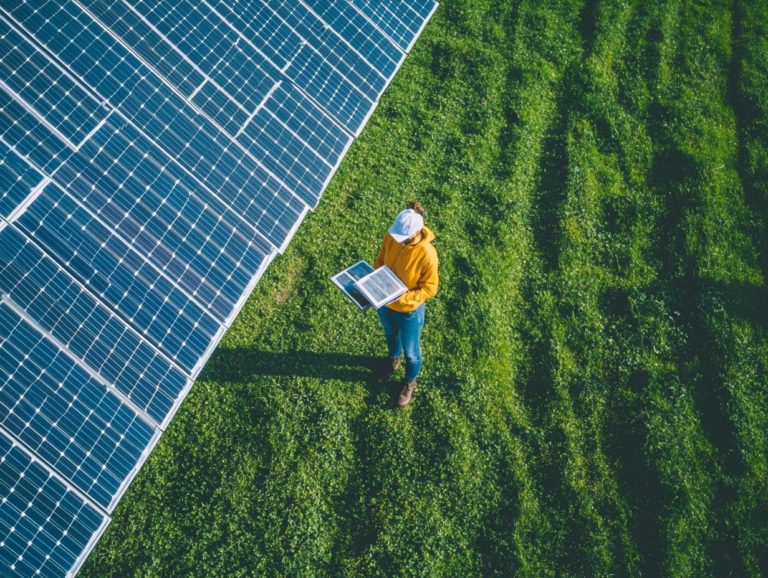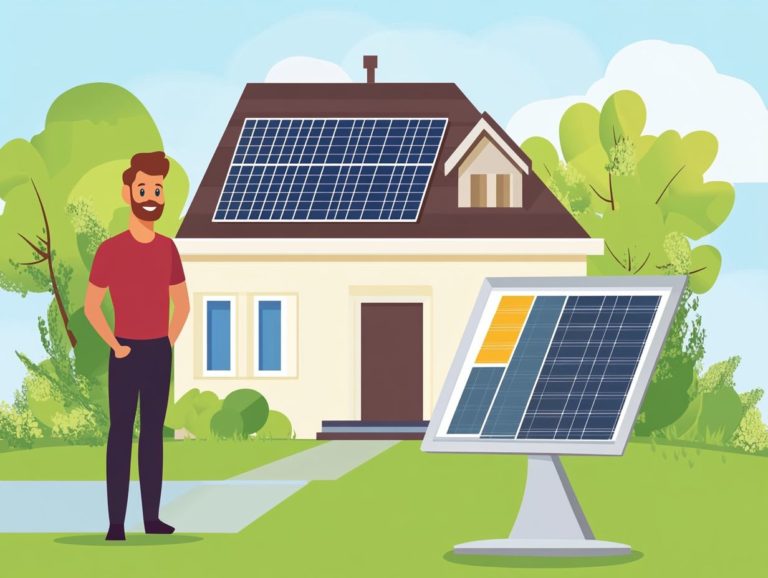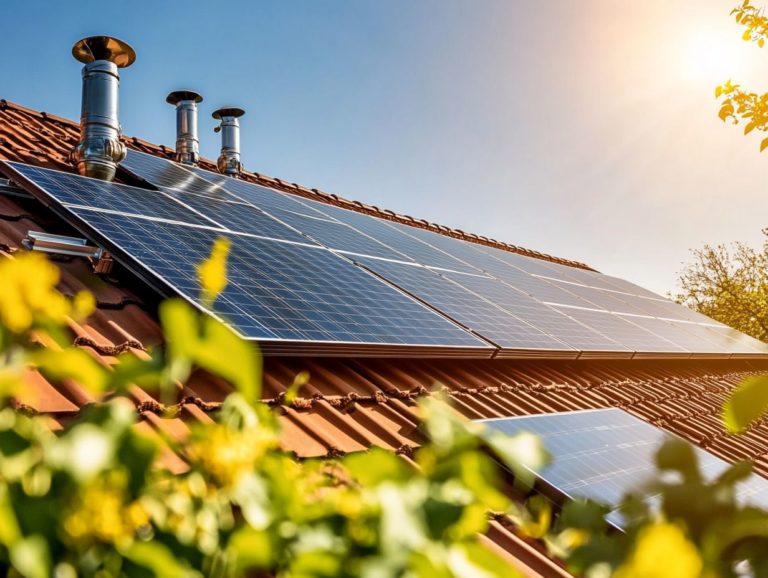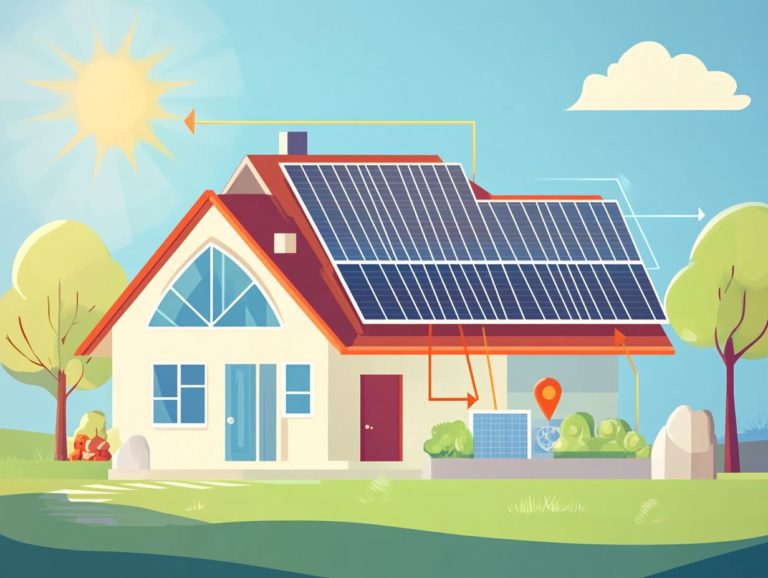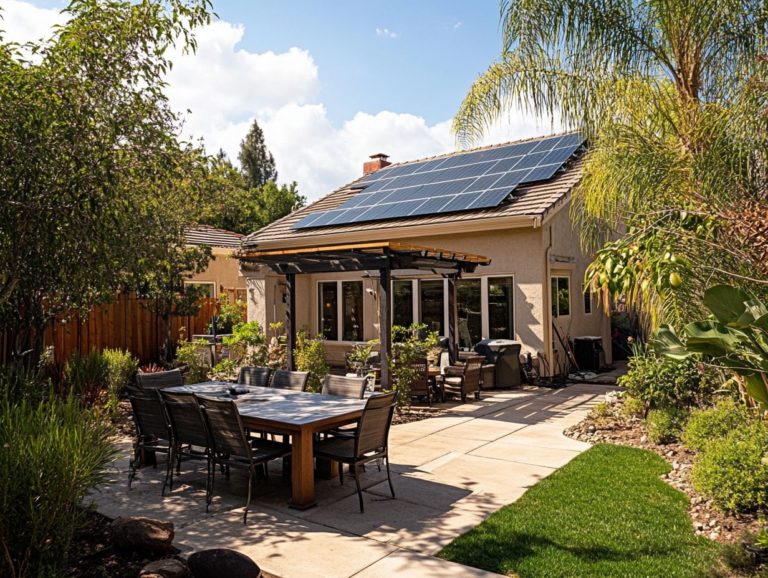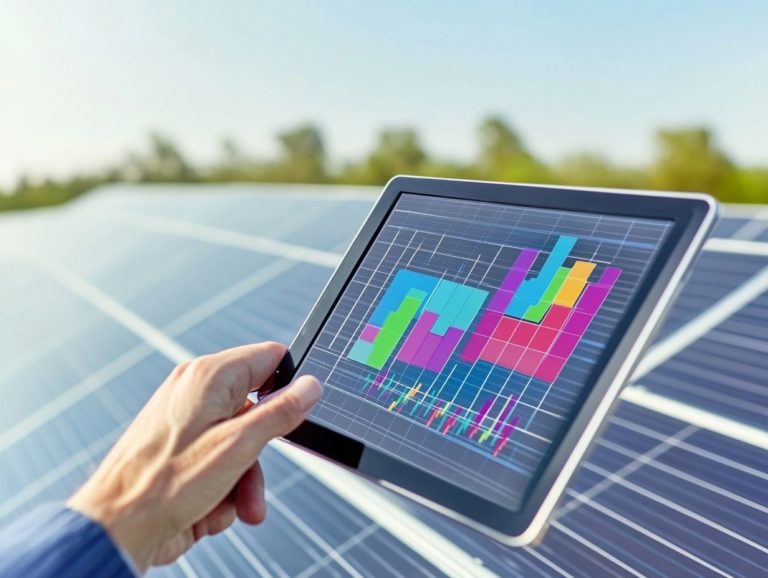“How to Calculate Your Home’s Solar Energy Needs”
Curious about harnessing the power of the sun for your home? Solar energy offers many benefits, including lower electricity bills and a reduced carbon footprint.
Before diving in, understand how factors like location, climate, and energy use affect your solar needs. This guide helps you calculate your needs, choose the right solar system, and explore installation options.
With straightforward steps and actionable tips, you ll be well-prepared to make informed decisions about transitioning to solar energy.
Contents
- Key Takeaways:
- Understanding Solar Energy
- Factors Affecting Solar Energy Needs
- Calculating Solar Energy Needs
- Choosing the Right Solar System
- Installation and Maintenance
- Frequently Asked Questions
- What factors should be considered when calculating my home’s solar energy needs?
- How can I determine my home’s energy consumption?
- Why is location important when calculating my home’s solar energy needs?
- What is the best way to calculate the roof angle and orientation for optimal solar energy production?
- How do I calculate the number of solar panels needed for my home?
- Can I reduce my home’s energy consumption to lower my solar energy needs?
Key Takeaways:

Discover how solar energy can save you money and protect the environment. Understand the key elements like location and energy use to tailor the perfect solar solution for your home.
Understanding Solar Energy
Understanding solar energy is essential for homeowners and business owners, representing a shift toward sustainable living and energy independence.
By harnessing sunlight through technologies like solar panels, you can convert sunlight into electricity, providing a clean, renewable alternative to conventional energy sources.
The benefits are abundant, from long-term savings to a reduced carbon footprint. You ll find various incentives and resources to help you navigate the transition to solar power, making it a compelling choice for eco-conscious consumers.
Exploring solar technologies, including solar-powered water purification and battery systems, can give you a comprehensive understanding of this valuable resource.
Benefits of Solar Energy for Homes
The benefits of solar energy for your home are extensive, offering substantial long-term savings and a seamless transition to sustainable living. By utilizing home solar panel kits, you can significantly reduce your electricity bills while contributing to a cleaner environment.
Installing solar systems promotes energy independence, reduces reliance on fossil fuels, and can increase your home s value. With various solar incentives available, making the switch becomes financially feasible for many households. Plus, integrating solar-powered gadgets enhances your home s overall energy efficiency.
This remarkable shift to solar energy shields you from unpredictable energy prices and enables you to generate your own power, providing greater control over your expenses. Homeowners typically save an average of 20-30% on their annual energy costs, translating to hundreds of dollars saved each year.
Studies show that homes equipped with solar panels have market values 4-5% higher than their non-solar counterparts, making a strong case for investing in solar technology.
Beyond financial perks, the environmental benefits are equally impressive. By harnessing sunlight, you can dramatically reduce your carbon footprint, supporting the fight against climate change while promoting cleaner air and healthier communities.
Factors Affecting Solar Energy Needs
Several factors shape your solar energy needs, including geographical location, local climate, and overall home energy consumption. It s essential to assess your specific situation carefully.
The effectiveness of solar panel systems hinges on the amount of sunlight your area receives; sunnier regions often enjoy higher solar energy output. The local climate also affects how well your solar installations work, as weather patterns can enhance or hinder energy production.
By understanding these factors, you can accurately calculate your solar energy requirements and invest in the right technologies like solar battery systems and advanced energy systems for optimal performance.
Location and Climate
When assessing solar energy potential, location and climate are crucial factors that directly influence your daily solar power output and system efficiency. If you’re in a region blessed with consistent sunlight year-round, you’re looking at optimal conditions for solar energy production.
On the flip side, areas with frequent cloud cover or extreme weather may find their solar panel kits underperforming. By understanding local climate patterns, you can make informed choices about the type and size of solar energy systems that best suit your needs, as highlighted in various solar panel kit reviews.
For example, if you live in a coastal area, the high humidity and storm activity can affect the durability and efficiency of your solar installations. Conversely, if you’re in a sunny desert, you re in for a treat those locations provide unparalleled solar exposure, making them ideal for large-scale solar farms.
Seasonal variations also play a significant role in energy output, especially in regions that endure harsh winters or heavy rainfall. To maximize your energy production, you might need to adapt your installation strategies, such as tilting solar panels for optimal sun capture throughout the year.
By taking these geographical and climatic nuances into account, you can significantly enhance the performance and sustainability of your solar energy system.
Home Energy Consumption
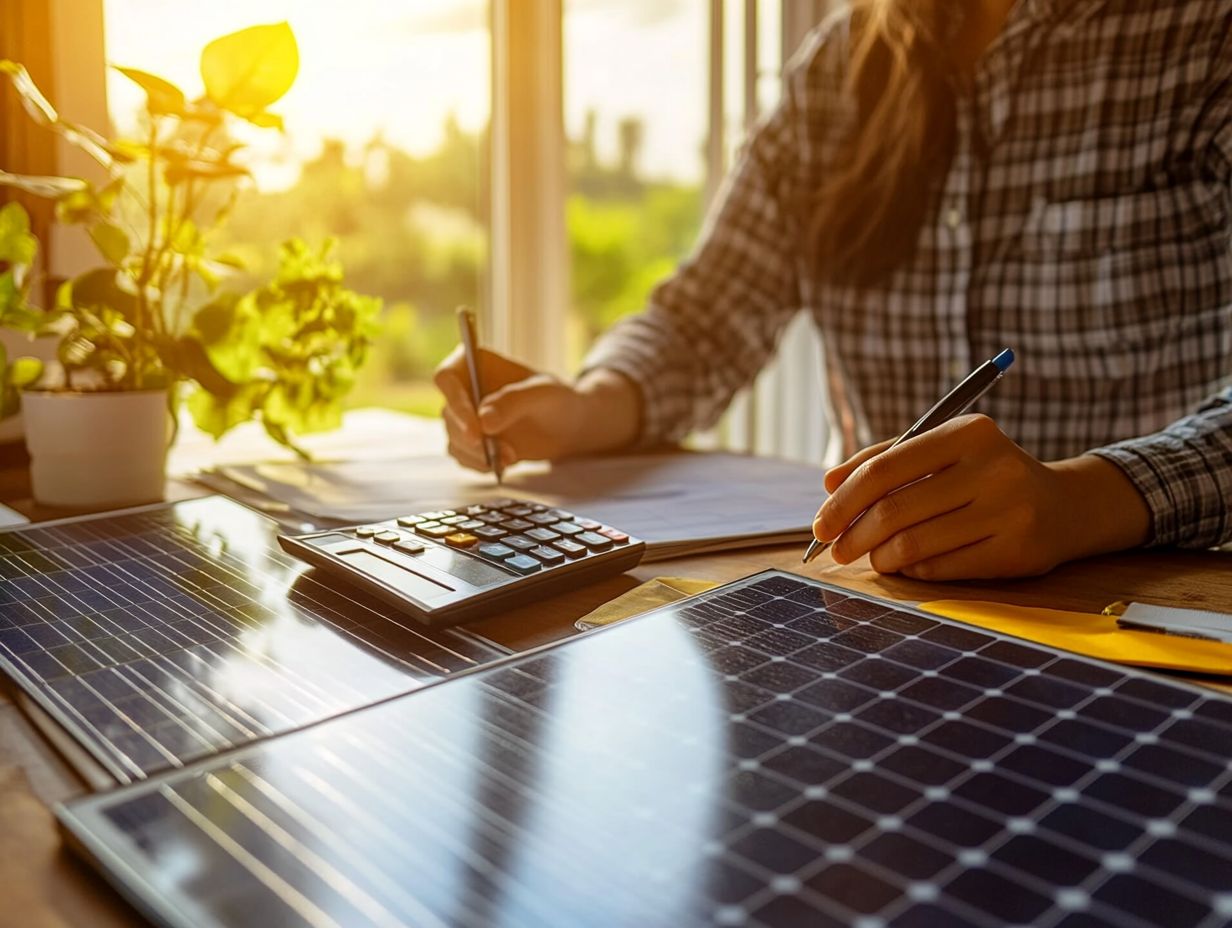
Home energy consumption is an important aspect in determining the right solar panel system for your household. By accurately calculating your solar energy needs, you can effectively manage your energy use.
Understanding how much energy your home consumes allows you to customize your solar installation to meet your specific requirements. You might even consider using energy monitoring systems to track your consumption patterns.
Evaluate solar products and improve energy efficiency to make informed decisions that optimize your solar investment. One effective strategy is to take inventory of all major energy use areas, including:
- Heating
- Cooling
- Lighting
- Appliances
By scrutinizing these sectors, you can identify peak usage times and discover potential savings through energy-efficient technologies.
Researching different solar configurations, such as grid-tied (connected to the power grid) or off-grid (not connected to the power grid) systems, enables you to choose a setup that aligns perfectly with your consumption habits. It may also be wise to consider battery storage options to maximize your solar investment, ensuring you have access to power even during those less sunny days, which will further enhance your energy independence.
Calculating Solar Energy Needs
Calculating your solar energy needs is a vital step that enables you to customize your solar panel system to effectively meet your unique energy demands.
Gaining a thorough understanding of daily solar power output, alongside a precise assessment of your total energy consumption, is crucial for ensuring that your solar installation is not just efficient but also economically sound.
By following a comprehensive, step-by-step guide, you can accurately determine your energy needs, enabling you to make informed decisions when investing in solar technologies.
Don t miss out on tailoring your solar system to fit your needs perfectly. Start calculating today!
Step-by-Step Guide
A step-by-step guide to calculating your solar energy needs can greatly simplify the process of selecting the right solar panel systems for your situation. By breaking this down into manageable steps, you ll gain a clearer understanding of how much solar power you should consider for your home or business.
- Start by noting your total monthly kilowatt-hour (kWh), a unit of energy that measures how much electricity you use, usage, which you can typically find on your electricity bill.
- Once you have that figure, simply divide it by the average solar hours available in your location to estimate the necessary system size in kilowatts (kW).
For example, if your household consumes 900 kWh per month and benefits from about 5 hours of sunlight each day, your calculations would suggest you need a system around 6 kW. This method provides clarity in determining the capacity of solar panels required to effectively meet your specific energy needs.
Choosing the Right Solar System
Selecting the ideal solar system is essential for getting the most out of solar energy, which requires careful consideration of the various types and their unique attributes.
You ll want to consider your energy requirements, budget limitations, and available space to make well-informed choices. Sizing plays a pivotal role, directly impacting your cost; thus, gaining insight into the differences between grid-tied (connected to the main power grid), off-grid solar-wind systems, and hybrid systems will enable you to choose the best option tailored to your specific needs.
Types of Solar Systems
There s a wide array of solar systems available, each tailored to meet different energy needs. You can choose from solar panel systems, off-grid solar-wind setups, and portable solar generators. Each type comes with its own set of advantages, based on your specific requirements, geographical location, and energy consumption habits.
For instance, if you live in a suburban area with plenty of roof space, a solar panel system could be your best bet. It efficiently captures energy and helps slash those electricity bills.
On the other hand, if you’re in a more remote location, off-grid solar-wind systems can be invaluable. They harness both solar and wind energy, ensuring you have a reliable power supply even when the weather doesn t cooperate.
And let s not forget about portable solar generators they’re a real game-changer. Perfect for outdoor enthusiasts or anyone preparing for emergencies, they provide a lightweight and convenient way to power your devices while camping or during unexpected power outages.
By carefully considering your personal energy needs and where you live, you can select the solar system that best enhances your lifestyle and boosts your energy independence.
Sizing and Cost Considerations
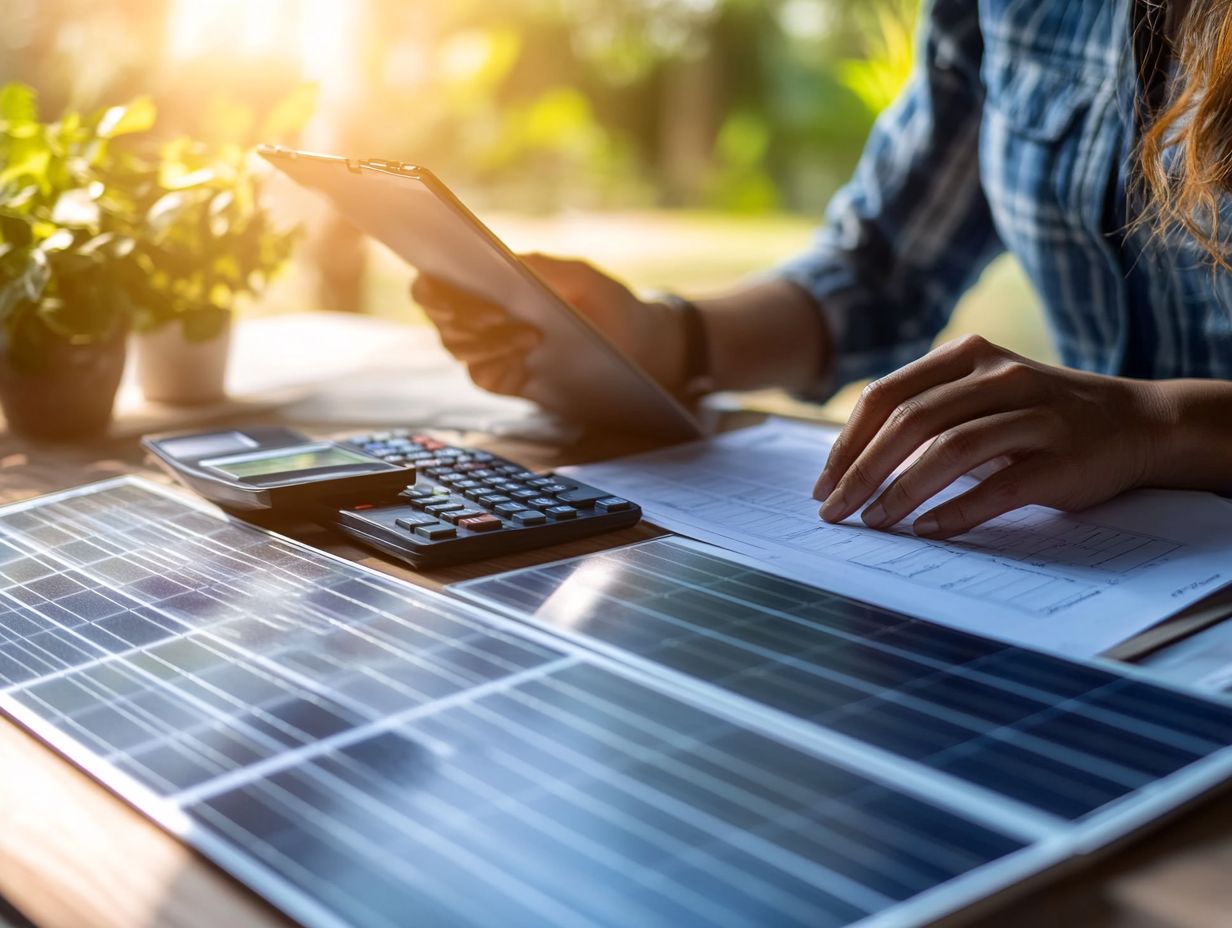
Sizing and cost considerations are essential elements in your solar system selection process, influencing both the financial feasibility and efficiency of your solar panel setup. By accurately calculating your energy needs, you can determine the appropriate size for your solar installation, which in turn affects the overall cost.
Consider renewable energy crowdfunding to reduce upfront costs, making solar energy more accessible for you. Understanding these factors ensures you secure a solar solution that aligns perfectly with your budget and energy requirements.
It’s vital to look into local incentives and rebates that can significantly lower your initial investment. Different setups, such as grid-tied, off-grid, or hybrid systems, come with varied costs and benefits that can sway your decision-making.
Financing options like solar loans or leases offer flexibility, allowing you to find a plan that perfectly fits your budget.
By thoughtfully navigating these considerations, anyone interested in solar energy like yourself can discover a solution that not only meets their energy needs but also comfortably fits within their financial constraints.
Installation and Maintenance
The installation and maintenance of solar systems are vital for ensuring optimal performance and longevity. You need to weigh the options between professional installation and a DIY approach.
Engaging professional services offers you expertise and peace of mind, while a DIY setup can be more budget-friendly if you possess the right tools and knowledge.
Regular maintenance is imperative; this includes cleaning your solar panels with suitable equipment and routinely checking system performance to maximize efficiency and energy output.
By grasping these important aspects, you enable yourself to maintain your solar investment effectively.
Professional Installation vs. DIY
When you’re deciding between professional installation and DIY solar installation, it’s essential to consider the pros and cons of each approach. Think about efficiency, cost, and expertise.
Choosing professional installation typically ensures quality workmanship and meets safety rules. This makes it a reliable option if you’re not well-versed in solar systems.
On the other hand, going the DIY route can lead to significant savings and a hands-on experience with your energy solutions. It’s especially true if you dive into comprehensive solar panel kit reviews beforehand. Ultimately, your decision will depend on your comfort level and the complexity of the project.
Professionals bring extensive knowledge and experience, which guarantees optimal performance and seamless integration with your home’s setup. However, the upfront costs might make budget-conscious homeowners hesitate.
Conversely, attempting a DIY installation could expose you to pitfalls, like improper mounting or electrical issues, particularly if you don t conduct sufficient research.
For straightforward projects, a DIY approach can be fulfilling and cost-effective. However, for more complex systems or when local regulations are strict, reaching out to professionals is often the smarter choice.
By weighing these factors, you can make a decision that aligns perfectly with your energy needs and financial goals.
Regular Maintenance and Upkeep
Keep your solar system in top shape! Regular maintenance boosts performance and energy output over time.
Establish a maintenance schedule that includes routine inspections, cleaning with appropriate solar panel cleaning equipment, and monitoring system performance. This ensures that any potential issues are quickly identified and addressed.
By taking proactive measures like checking for dirt or debris on your panels and ensuring that all connections are secure you can significantly enhance energy efficiency.
Don t wait! Schedule a professional assessment at least once a year to keep your system running smoothly. This thorough approach prolongs the lifespan of your system and boosts your overall return on investment.
By being diligent in monitoring and caring for your equipment, you support both environmental sustainability and your financial savings in the long run.
Frequently Asked Questions
What factors should be considered when calculating my home’s solar energy needs?
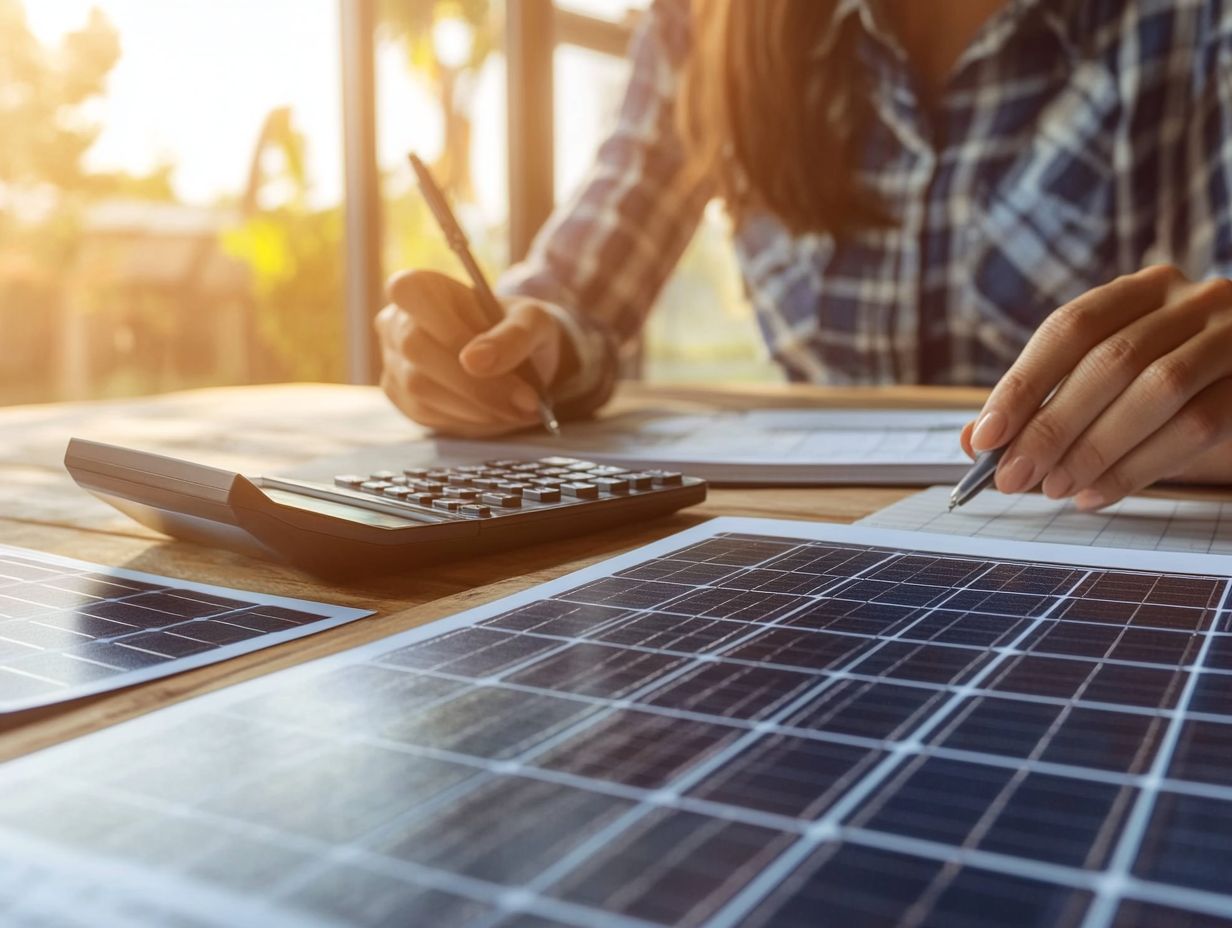
When calculating your home’s solar energy needs, you should consider factors such as your home’s energy consumption, location, roof angle and orientation, and the efficiency of the solar panels you plan to install.
How can I determine my home’s energy consumption?
To determine your home’s energy consumption, look at your energy bills and add up the total kilowatt-hours used over a specific period. This will give you an estimate of your average daily energy consumption.
Why is location important when calculating my home’s solar energy needs?
The location of your home plays a crucial role in determining your solar energy needs. The amount of sunlight your home receives throughout the year affects the energy your solar panels can produce.
What is the best way to calculate the roof angle and orientation for optimal solar energy production?
The optimal roof angle and orientation for solar energy production is typically facing south at an angle of 30-45 degrees. However, you can use online tools or consult with a solar energy expert to determine the best angle and orientation for your specific location.
How do I calculate the number of solar panels needed for my home?
To calculate the number of solar panels needed for your home, divide your average daily energy consumption by the average daily energy production of a solar panel in your area. This will give you an estimate of the number of panels needed to meet your home’s energy needs.
Can I reduce my home’s energy consumption to lower my solar energy needs?
Yes, reducing your home’s energy consumption through energy-efficient upgrades and practices can help lower your solar energy needs. This can ultimately mean needing fewer solar panels and saving money on your overall solar energy system.
Start your solar journey today and enjoy the benefits of clean energy!

